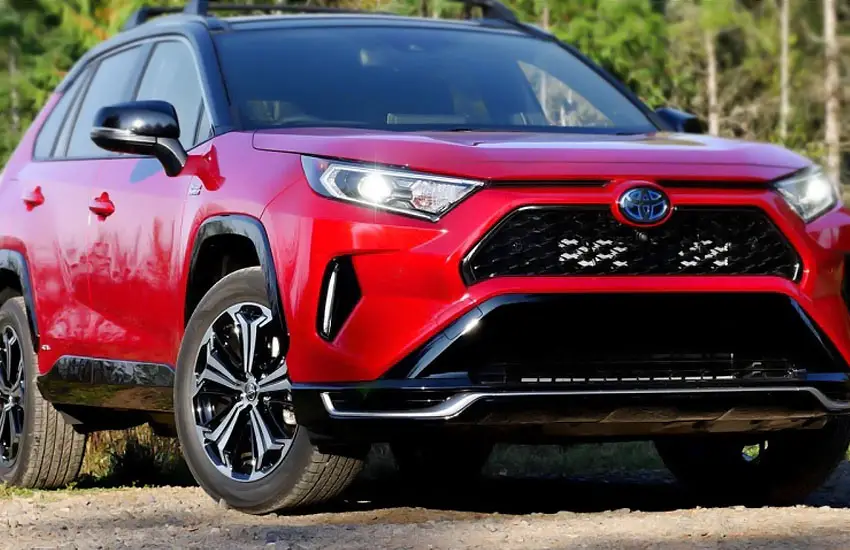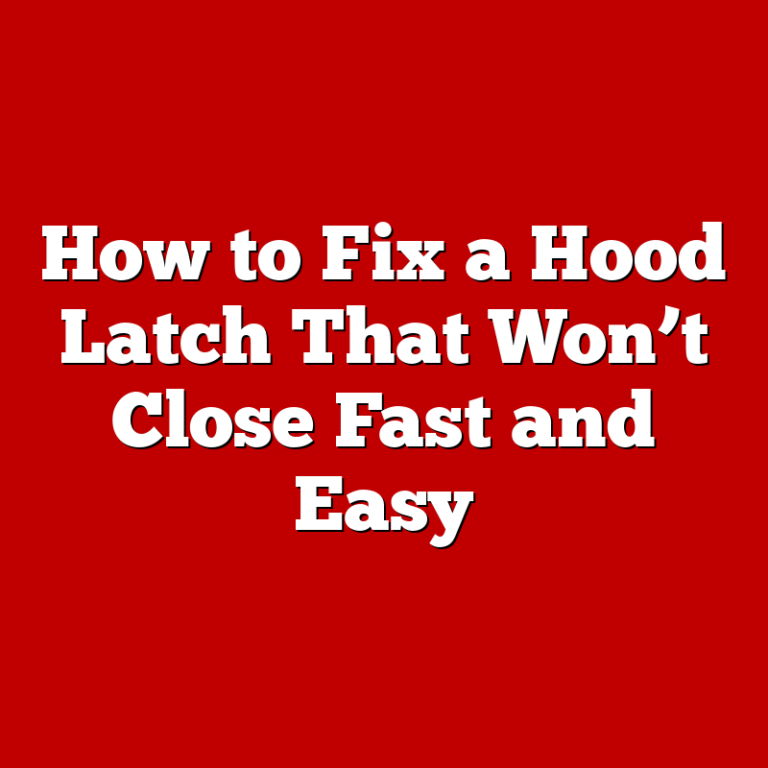As an Amazon Associate, I earn from qualifying purchases at no extra cost to you.
VSC and ABS Light on Toyota RAV4: Troubleshoot and Fix the Issue Fast
You may have noticed the VSC and ABS lights lighting up on your Toyota RAV4’s dashboard. These warning lights are there to alert you about issues with your car’s stability and braking systems. Understanding what these lights mean can help you address potential problems quickly.
In this article, we'll break down the causes of these warning lights and provide simple steps to diagnose and fix them. Knowing how to respond can keep your RAV4 running safely and smoothly.
Understanding VSC and ABS Lights
The VSC and ABS lights are warning signs on your Toyota RAV4 that something might be wrong with your vehicle.
The VSC light stands for Vehicle Stability Control. This system helps keep your car steady, especially on slippery roads. When this light comes on, it usually means the system is turned off or not working right. It can also light up if you are driving on a slippery surface, like ice or snow.
The ABS light stands for Anti-lock Braking System. This system helps your brakes work better and prevents them from locking up during hard stops. If this light is on, it means there might be a problem with the ABS system. It could be a simple issue, like a sensor problem, or something more serious, like a brake fluid leak.
Both lights can turn on together if there is a problem with the systems they control. Sometimes, the issue might be as simple as a loose wheel speed sensor or a blown fuse. Other times, it could be more complex, like a problem with the brake system or the control module.
If you see these lights on your dashboard, it is a good idea to check them soon. You might be able to fix the issue with a simple check-up. But if you're not sure what to do, it's best to take your car to a mechanic. They can diagnose the problem and ensure your RAV4 is safe to drive.

Common Causes for VSC and ABS Light Activation
Issues with the Brake System
One common reason the VSC and ABS lights come on is a problem with the brake system. If your brake fluid is low, the ABS light may turn on. The brake system might have a leak, or the brake fluid might not be at the right level.
Another issue could be worn-out brake pads or damaged brake lines. When these things happen, the ABS system can't work properly, and both lights might come on.
Problems with Wheel Speed Sensors
Wheel speed sensors help the ABS system know how fast each wheel is turning. If one of these sensors is dirty or broken, it can cause the ABS light to turn on.
The VSC light might also come on because the Vehicle Stability Control system relies on these sensors to work correctly. Cleaning or replacing the sensors can often fix the problem.
Issues with the VSC System
The VSC light can come on if there is a problem with the Vehicle Stability Control system itself. This system helps your car stay stable on slippery or uneven surfaces.
If the VSC system has a malfunction or a part is faulty, the light will turn on to let you know. Sometimes, it might be an issue with a fuse or a wiring problem.
Faulty ABS Module
The ABS module controls how the ABS system works. If the ABS module is faulty, it can cause the ABS light to come on. This issue might be due to a problem with the module's internal parts or its connections. Replacing or repairing the module may be necessary to fix the issue.
Electrical Problems
Sometimes, electrical problems can cause both the VSC and ABS lights to come on. A blown fuse or a problem with the car's electrical wiring can cause these warning lights to activate. Checking the fuses and inspecting the wiring can help identify and fix these electrical issues.
Steps to Fix VSC and ABS Light Problems
Check and Top Up Brake Fluid
If the VSC and ABS lights are on, the first thing you should do is check the brake fluid level. Open the hood and find the brake fluid reservoir. It's usually a clear container with a cap labeled "brake fluid."
Look at the level inside the reservoir. If it's low, add brake fluid until it reaches the "max" line. Be careful not to overfill it. This simple step might turn off the ABS light if low brake fluid was the issue.
Clean or Replace Wheel Speed Sensors
Another common reason for the warning lights is dirty or damaged wheel speed sensors. These sensors are located near each wheel. You can see them if you look behind the wheels or near the brake area.
Check for dirt or debris around the sensors. If they are dirty, clean them gently with a cloth. If you notice any damage or if cleaning doesn't help, you might need to replace the sensors. Replacing them can fix the problem and turn off both the VSC and ABS lights.
Inspect and Replace Fuses
The next step is to check the fuses related to the ABS and VSC systems. The fuse box is usually located under the hood or inside the car. Find the fuse box cover and look at the diagram to locate the fuses for the ABS and VSC systems.
If a fuse is blown, it will look broken or blackened. Replace the blown fuse with a new one of the same type. This can fix the problem and might turn off the warning lights.
Reset the VSC and ABS Systems
After checking and fixing the above issues, you can try resetting the VSC and ABS systems. To do this, turn off your car and wait for a few minutes.
Then start the car again and see if the lights go off. Sometimes, simply resetting the systems can fix the problem if it was a temporary issue.
Seek Professional Help
If the VSC and ABS lights are still on after following these steps, it's time to visit a mechanic. Professional mechanics have special tools to diagnose and fix more complex issues.
They can check the systems thoroughly and determine if there's a deeper problem that needs repair. It's important to get these issues fixed because they can affect your car's safety and performance.
Frequently Asked Questions
What should I do if the VSC light comes on but the ABS light is off?
If the VSC light comes on while the ABS light is off, it usually means there's a problem with the Vehicle Stability Control system. This system helps your car stay stable on slippery or uneven surfaces.
The issue might be a faulty sensor or a problem with the system's components. You can try resetting the system by turning off the car and starting it again. If the light remains on, it's best to have a mechanic inspect the VSC system to diagnose and fix the issue.
Can I drive my Toyota RAV4 with the VSC and ABS lights on?
While it's generally safe to drive with the VSC and ABS lights on, it's not ideal. These lights indicate there might be issues with your car's stability and braking systems.
The ABS light means the anti-lock braking system is not functioning properly, which can affect your ability to stop safely in an emergency. The VSC light means the stability control system might not be working. It's best to get your car checked by a mechanic as soon as possible to avoid potential safety risks.
How can I reset the VSC and ABS lights?
To reset the VSC and ABS lights, start by checking for simple issues like low brake fluid or blown fuses. Fix any problems you find and then turn off the car. Wait for a few minutes before starting the engine again.
Sometimes, this simple reset can turn off the lights. If the lights stay on, there might be a more serious issue requiring professional diagnosis and repair.
How often should I check the brake fluid level?
You should check the brake fluid level at least once a month or before long trips. Regular checks help ensure your brake system is working properly.
If you notice the brake fluid level is low, top it up and keep an eye on it to see if the level drops again. Low brake fluid can lead to braking issues and may cause the ABS light to come on.
What does it mean if both the VSC and ABS lights come on together?
When both the VSC and ABS lights come on together, it usually indicates a problem with the stability and braking systems. It could be due to a common issue affecting both systems, like a problem with the wheel speed sensors or brake fluid level.
If both lights are on, it's important to have your car inspected by a mechanic to identify and fix the underlying problem.
Are there any warning signs before the VSC and ABS lights come on?
Yes, there are often warning signs before the VSC and ABS lights come on. You might notice reduced braking performance, unusual noises, or the car feeling unstable, especially on slippery surfaces.
If you experience any of these symptoms, it's a good idea to check your car's systems and fluid levels or visit a mechanic before the lights turn on.
Can driving on rough roads cause the VSC and ABS lights to come on?
Driving on rough or uneven roads can sometimes trigger the VSC and ABS lights, especially if there is an existing issue with the braking or stability systems.
The VSC system may activate if it detects instability, and the ABS light might come on if the system detects a problem with the anti-lock brakes. If the lights remain on after driving on rough roads, it's important to have your car checked to rule out any serious issues.
What are the common repairs for VSC and ABS light issues?
Common repairs for VSC and ABS light issues include replacing or cleaning wheel speed sensors, topping up or changing brake fluid, and replacing blown fuses.
If the problem is more complex, such as a faulty ABS module or damaged wiring, professional repairs may be needed. A mechanic can perform a thorough diagnosis and recommend the necessary repairs.
Can a faulty brake light switch affect the VSC and ABS lights?
Yes, a faulty brake light switch can affect the VSC and ABS lights. The brake light switch is connected to the ABS and VSC systems and helps them function properly.
If the switch is malfunctioning, it can cause the warning lights to come on. Replacing the faulty brake light switch can sometimes resolve the issue with the VSC and ABS lights.
What is the cost of repairing VSC and ABS light issues?
The cost of repairing VSC and ABS light issues varies depending on the problem. Simple fixes like replacing a fuse or topping up brake fluid might cost less than $100.
However, more complex repairs, such as replacing wheel speed sensors or the ABS module, can be more expensive, ranging from $200 to $1,000 or more. It's best to get a quote from a mechanic after they diagnose the issue.
I hope this guide helps you understand why the VSC and ABS lights are on in your Toyota RAV4. By following these steps, you can troubleshoot and fix the issue quickly. If you need more help, don’t hesitate to reach out to a mechanic. Safe driving!





